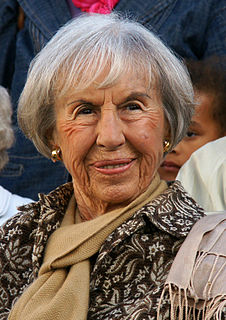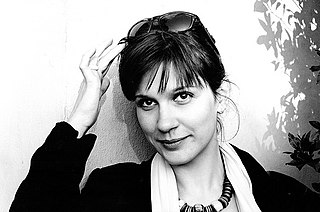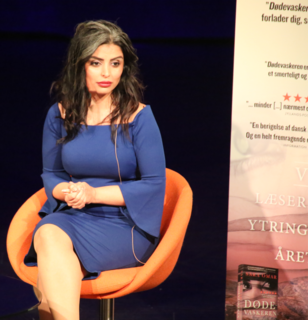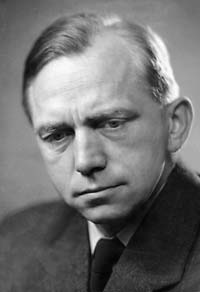
Leif Davidsen (born 25 July 1950 in Otterup) is a Danish author and journalist.

Leif Davidsen (born 25 July 1950 in Otterup) is a Danish author and journalist.
Educated as a journalist, in 1977 he started working in Spain as a freelance journalist for Danmarks Radio. In 1980 he began covering Soviet news with frequent news reports to Danmarks Radio from Russia. From 1984 to 1988 he was stationed in Moscow. As a journalist he has travelled extensively around the world. When Davidsen returned to Denmark he became chief editor of Danmarks Radio's foreign news desk. From 1996 he edited a TV series called “Danish Dream” about Denmark today. In 1991 he won the Danish booksellers award De Gyldne Laurbær (The Golden Laurel) for his book Den sidste spion. [1] In 1999, he became a full-time writer.
Davidsen writes political thrillers, which depict life of modern man in a changing world. Even if many of the characters are of Danish origin, the settings of the stories are often abroad. [2] Davidsen published his first book Uhellige alliancer or The Sardine Deception in 1984. It is a story of intrigue in the Spanish Basque Country shortly after Franco's death. Other works include:

Tove Irma Margit Ditlevsen was a Danish poet and author. With published works in a variety of genres, she was one of Denmark's best-known authors by the time of her death.

Peter Høeg is a Danish writer of fiction. He is best known for his novel, Miss Smilla's Feeling for Snow (1992).

Carsten Jensen is a Danish author and political columnist. He first earned recognition as a literary critic for the Copenhagen daily, Politiken. His novels, including I Have Seen the World Begin (1996), deal with knowledge of the world. For this novel he won the Danish booksellers award De Gyldne Laurbær in 1996. The year 2006 saw the publication of his novel Vi, de druknede, a chronicle about the birth of modern Denmark, seen through the history of his hometown Marstal.

Danish literature a subset of Scandinavian literature, stretches back to the Middle Ages. The earliest preserved texts from Denmark are runic inscriptions on memorial stones and other objects, some of which contain short poems in alliterative verse. In the late 12th century Saxo Grammaticus wrote Gesta Danorum. During the 16th century, the Lutheran Reformation came to Denmark. During this era, Christiern Pedersen translated the New Testament into Danish and Thomas Kingo composed hymns. Fine poetry was created in the early 17th century by Anders Arrebo (1587–1637). The challenges faced during Denmark's absolute monarchy in 1660 are chronicled in Jammersminde by Leonora Christina of the Blue Tower. Ludvig Holberg (1684–1754), influenced by the ideas of the Enlightenment and Humanism, is considered the founder of modern Danish and Norwegian literature. Neoclassical poetry, drama, and the essay flourished during the 18th century influenced by French and English trends. German influence is seen in the verse of the leading poets of the late 18th century such as Johannes Ewald and Jens Baggesen. Other 18th century writers include the hymn writer Hans Adolph Brorson and the satirical poet Johan Herman Wessel.

Jens Christian Grøndahl is a Danish writer.
Aage Bergishagen Dons was a Danish writer. He is best known for his novels, De uønskede, Frosten paa Ruderne, and Den svundne tid er ej forbi.

Lise Nørgaard is a Danish journalist and writer known for her precise and often humorous portrayals of Danish cultural life. Nørgaard has written novels, compilations of essays and short stories. The memoir of her childhood, Kun en pige, became a bestseller in 1992 and is considered her masterpiece. The work was adapted into a feature film in 1995.
Steven T. Murray (1943–2018) was an American translator from Swedish, German, Danish, and Norwegian. He worked under the pseudonyms Reg Keeland and McKinley Burnett when edited into UK English. He translated the bestselling Millennium series by Stieg Larsson, three crime novels and two African novels by Henning Mankell, three psychological suspense novels by Karin Alvtegen, and works by many other authors. In 2001 he won the Gold Dagger Award in the UK for his translation of Sidetracked by Henning Mankell.
Leif Thormod Panduro was a Danish writer, novelist, short story writer, and dramatist. A dentist by profession, he began in his thirties to write stories about people who can't conform to society's rules for one reason or another. Rend mig i traditionerne, from 1959 is about an adolescent who finally ends up in an asylum because he thinks society is mad. This novel was made into a film in 1979. Fern fra Danmark is about a man who wakes up in a hospital with amnesia but discovers more and more about a not very pleasant self.

Johannes Volf Møllehave was a Danish Lutheran priest, author and lecturer.

Christian Frederik von Schalburg was a Danish army officer, the second commander of Free Corps Denmark and brother of Vera Schalburg.

Christianity is a prevalent religion in Denmark; in January 2020, 74.3% of the population of Denmark were members of the Church of Denmark. According to a survey based on a sample 1,114, 25% of Danes believe Jesus is the son of God, and 18% believe he is the saviour of the world. Aside from Lutheranism, there is a small Catholic minority, as well as small Protestant denominations such as the Baptist Union of Denmark and the Reformed Synod of Denmark.

De Gyldne Laurbær is a Danish literature award, which was established in 1949. The award is handed by The Committee De Gyldne Laurbær, formerly Boghandlerklubben. The prize is given annually in February or March. Originally the award was a laurel wreath, a golden pin with an inscription, some money and a book gift worth 2500 DKK. Today the award is a laurel wreathe, a diploma and a book gift worth 2500 DKK. The award is handed at a ceremony arranged by the publishing house which has published the winning book and by the Committee De Gyldne Laurbær. Early in January every year the committee sends out ballot to all the Danish bookshops, which then give their vote for a Danish book which was published the year before. An author can only win The Golden Laurel once-in-a-lifetime, so the bookshops can not vote for an author who has already won the prize once before. The winner is usually one of the bestsellers among the Danish books. On the day when it is decided who wins the Golden Laurel, the president of the Committee of The Golden Laurel informs the winner about the award, while journalists follow the event.

Suzanne Preis Brøgger Zeruneith is a Danish writer, a novelist, poet and journalist. Her first book Fri os fra kærligheden has been translated into c. 20 languages. Since 1997 she has been a member of the Danish Academy.

Birgithe Kosovic is a Danish journalist and author who has received several awards for her novel Det dobbelte land based on her family's background in the former Yugoslavia.
Jakob Ejersbo was a Danish journalist and writer. His work is considered modern and neorealistic. Authoring the immensely popular novel, Nordkraft, which sold more than 100,000 copies, an unusually high sales figure on the book market in Denmark, Ejersbo became an established writer. A tale about three young people and drug problems in Aalborg, the work was turned into a film in 2005, directed by Ole Christian Madsen. Ejersbo is also well known for writing what is known as the Africa Trilogy, inspired by the author's own childhood experiences in Tanzania.
Jane Aamund was a Danish author and journalist. Her breakthrough in Denmark came with the Klinkevals trilogy.

Sara Omar is a Danish-Kurdish author, human rights activist and poet. She is the first internationally recognized female novelist from Kurdistan. She started out as a poet and has published several critical articles in the Middle Eastern media.

Alfred Martin Jens Hansen (20 August 1909 – 27 June 1955) was a Danish writer who wrote under the name Martin A. Hansen. He is known for his writings as a member of the Danish resistance movement during the German occupation of Denmark in WWII.
Hans Christian Branner was a Danish novelist, essayist and playwright. He was a leading writer of the post-World War II period in Denmark and a founder member of the Danish Academy. His work dealt with the themes of power, fear and loneliness and earned him several literary awards including De Gyldne Laurbær, the Holberg Medal (1954) and the Danish Playwrights' Honorary Award (1961).